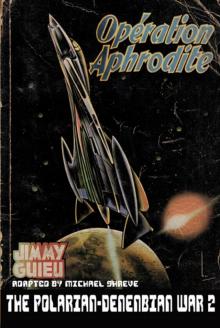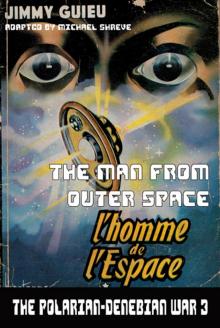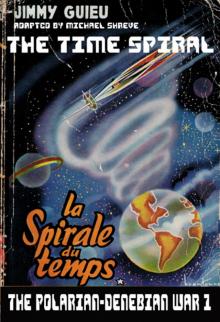- Home
- Jimmy Guieu
Polarian-Denebian War 5: Our Ancestors From the Future
Polarian-Denebian War 5: Our Ancestors From the Future Read online
The Polarian-Denebian War
(Volume 5)
Our Ancestors from the Future
by
Jimmy Guieu
translated by
Michael Shreve
A Black Coat Press Book
OUR ANCESTORS FROM THE FUTURE
For HIM who was contacted seven times by a Creature from Outer Space and who holds the material proof of these contacts. If only he could read this book, understand and reestablish the link that has been broken.
J.G.
CHAPTER ONE
The huge Khantangskoïe steppe, north of the Arctic Circle, spread its deserted landscape of immeasurable sadness over snowy and muddy hills, punctured by clumps of green or more often gray-brown plants. Broken in the west by the wide Khatanga River carting along huge ice floes, the Siberian tundra resumed its desolation farther on in the Taymyr Peninsula.
In -41C weather 100 men poorly dressed in rags—old military coats, hats with only a few patches of fur left, shoddy boots, legs protected slipshod against the terrible Siberian cold with burlap sacks tied around the calves—were wielding shovel or pick, digging trenches toward the river in order to drain the putrid swamps for the next thaw.
In the frozen, rock-hard mud they worked in pairs: one swinging his axe on the ground, the other clearing out the excavation by throwing shovelfuls of matter into a wheelbarrow that he would then empty into the big bucket of a tractor specially designed to work in low temperatures.
Two miles away from here, farther up Katanga Bay, stood the austere mass of the Rehabilitation Center—a concrete cube 165 feet long on every side—towering over the 20 bunkhouses that harbored the 2,000 residents to be rehabilitated.
The sun was low on the horizon this late afternoon and cast unusually long shadows of the workers over the fissured ground.
Exhausted, his back breaking from working his shovel since dawn, Colonel Zavkom straightened up, sore and shivering in the biting wind. After two years in this Rehabilitation Center all that was left of his powerful shoulders and herculean muscles was a bony frame holding up skin cracked by the relentless cold of the steppe. Leaning on his shovel he breathed noisily in a painful grimace, as worn out as he was.
His work partner, the physicist Petkov, six years older than him, stopped swinging his axe to take a breather. His once energetic face also bore the deep scars of forced labor along with a few days’ growth of beard. Only his blue eyes still reflected some intensity that contradicted the look of a man suffering in body and mind. He turned around to look at his partner in misfortune but he barely had time to raise his arm to shield his face. The club hit Colonel Zavkom first before flogging him.
The guard dressed warmly in a thick uniform with a fur cap, a machine gun hanging over his shoulder, swung his cudgel a second time at the convicts, yelling, “The work’s not done, pigs! You’ve still got ten minutes of digging. Another break and you’ll go to the tub!”
Without saying a word the two men went back to work, gnashing their teeth. They shivered thinking of the inhuman treatment that the tub punishment meant, too frequently, alas, in the Siberian penal colonies.
In the distance the muffled shrill of the siren at the Rehabilitation Center sounded, announcing the end of the workday. The convicts straightened up, some of them wobbling, and with tools on their shoulders lined up in four columns, surrounded by the ten guards with machine guns who gave the signal to march toward camp.
When they reached the double electric fence and (for more security) the tangle of barbed wire, night was already falling. The spotlight from the watchtower on top of the guards’ cube lit up a vast, open space in front of the concrete building. The 2,000 prisoners in close ranks stood still, numb with cold, in the huge square in the middle of which 50 armed guards formed a circle around a kind of cement vat, 15 feet wide, whose frozen surface had just been broken by a team of prisoners.
The last column came up to the vat just as Gulinski, the chief of the concentration camp euphemistically called a Rehabilitation Center, was coming out of the cube. Comfortably warm in his heavy uniform, his brutish face partly covered by his fur hood, he made a sign to an officer and stopped 15 feet away from the water-filled vat with ice floating on the surface after being struck with pickaxes.
The officer, a giant with the face of a tartar, swung his baton and made seven prisoners step up to the edge of the vat. The speakers set up around the square started crackling and the cynical voice of the chief spit out, like every evening for two years, his recorded speech:
“These men have dared to break the rules of the Rehabilitation Center. Through their rebellion and their laziness they have slowed down the work of draining the swamps. Since this Center is not a place for recreation but for work, they are going to suffer their justly earned punishment. Let this example serve as a lesson to those who still hope to escape or even just laze around. The ‘tub’ is only a warning. Repeat offenders will be put to death.”
Colonel Zavkom at the front of the column groaned to his friend Petkov, “A warning! As if these poor devils could survive the awful punishment.”
“It would have been better to die on the Moon than come back here to Russia after our failure1,” Petkov the physicist whispered back.
A guard whom they had not seen come up from behind the left column rushed over to them, his weapon raised.
“What is this?” the chief of the camp barked.
“These two men were whispering mean things about you, Chief,” the guard lied—he had simply seen their lips move—standing at attention before his superior.
“To the tub!” the brute shouted.
A glare of anger mixed with fear flashed in the eyes of the two prisoners who knew that if they protested against the lie they would still join the seven men condemned to the tub.
“Get undressed!” the tartar officer ordered, accompanying his words with blows from his baton. “You four first,” he said to the first comers.
The poor men did as told, their hands swollen from the cold, taking off their rags with tears in their eyes. One of them, a scrawny old man whose ribs poked through the white skin of his thin chest, begged them, gripping the edge of the vat. “Please, have mercy… I’m sick and…”
A kick in the back sent him toppling into the icy water that sprayed onto the three other naked prisoners shivering at the edge of the tub.
The old man sank, came back up, sank again and struggled to hang onto a big piece of ice. He coughed and breathed heavily, his eyes burning with fever, then choking he let go and with his mouth twisted in pain and suffering he died of congestion.
Then the guard pushed the other three and turned around to Zavkom and Petkov and their three companions he shouted, “Get your clothes off! Looks like the water’s just fine tonight!” He turned away laughing, which caught on with all the guards in camp.
The five convicts stood there, arms folded across their naked chest, teeth chattering, looking horrified at the ice floating back over the dying men who were struggling only feebly.
“Next!”
The guard brandished his baton. The five prisoners closed their eyes and instinctively protected their heads with their skinny arms from the blow to come. But the blow did not come. An outcry of amazement came pouring out of all lungs and even though their eyes were closed Zavkom and Petkov and the other three were blinded by a bright flash that they could not identify.
They popped open their eyes and were stunned to see that the guard was not there. In his place a black stain was in the frozen mud where the ice had melted.
The spotlight from the central watchtowe
r shined its beam over the columns of prisoners, crossed over the 20 barracks, then came back to flood the square where the tub punishment was being carried out.
All of a sudden the metal tower holding the spotlight and a battery of twin machine guns was surrounded by a bright light. Its crossed beams seemed to suddenly glow white and in a fantastic flash the thing disappeared in silence as if it had been wiped from the landscape by a magician.
A growing commotion swept through the 2,000 convicts. The chief of the concentration camp turned livid, thrown into a panic by the incomprehensible wonder. He ran in fear to the concrete building. Watching his flight the officers and guards stood still for a moment, not knowing what to do, then suddenly the officers were seized by panic and ran after their chief to the building, the invulnerable shelter where they could confront the… What, in fact? They wondered running at full speed.
The panic soon spread to the guards who left the prisoners and did as the officers who had just disappeared under the huge concrete vault of the building’s façade.
Colonel Zavkom, the physicist Petkov and their three companions having escaped by a miracle—the word was not too strong—from the tub punishment got dressed as quickly as they could. Their numb, frozen fingers grabbed the clothes that the poor dead men in the freezing vat were no longer wearing and threw them over their own rags.
It was at this moment that the thing happened. Colonel Zavkom and Petkov, at the same time, stopped wrapping the burlap around their calves. Dumbfounded, they stood up and looked at each other blankly. In spite of the commotion among the 2,000 convicts left free, a clear, deep voice, a weird voice rang out in their minds. For, this voice, unheard by the others prisoners, came to them by telepathy.
Colonel Zavkom and you, Petkov, brave pilot of the first Russian rocket to the Moon, Zimko is speaking to you!
Nervously grabbing his friend’s arm Zavkom whispered in a hoarse voice while looking around at the deplorable setting of the concentration camp, “Petkov, it’s… the telepathic voice of Zimko, the Man from Outer Space and the Chief of the Space Commandos whom Kariven once told us about…”
“In that fiasco on the Moon? That fiasco that brought us into this death camp? Could it be? But where… where are you, Zimko?”
On the roof of the building where your executioners are hiding. Can’t you see me? They heard clearly in their heads.
They looked up at the spot. Against the background of the starry sky they could make out a silhouette that was saluting them with a raised right hand as is the custom among Polarians, those super-evolved, humanoid creatures who were watching planet Earth on board their disc-shaped spaceships called “flying saucers” by Earthlings.
Abruptly the spotlight from a corner watchtower swept over the camp and lit up the stranger on the roof of the building. The cone of light stopped, settled and framed the form of Zimko who, brightly lit up by the beam, appeared clearly to all the prisoners. Looking up at him, stunned, the convicts wondered who this man dressed in a kind of gray-green spacesuit with a transparent round helmet could be.
“Get down!” Colonel Zavkom shouted.
The rattle of a machine gun from the corner watchtower drown out his words and a hail of bullets shrieked over the roof where Zimko was standing. Even though the bullets were whistling by his ears, he seemed content to just stand there. In the square and between the buildings, at the first volley, the prisoners threw themselves to the ground. Another round of gunfire, longer than the first, ripped through the silence.
“Zimko!” Petkov howled desperately, “Get down!”
Astounded, Petkov and Zavkom watched as the lethal bullets stopped, inexplicably, ten feet in front of the Man from Outer Space and showered down harmlessly along the face of the building.
“It’s unbelievable!” Petkov said. “Zimko is probably protected by a strong magnetic field that’s stopping the bullets.”
The man from another planet, under the machine gun fire, unholstered the huge pistol hanging from his wide belt, aimed carefully at the watchtower and fired. A blue ray shot out of the barrel and struck the top of the tower. Zimko moved his wrist and brought the ray down along the metal supports and the construction suddenly lit up bright orange… then disappeared.
He put his disintegrator weapon back in the holster and pressed two buttons on a rectangular device stuck to his belt. He slowly rose up by activating his jet pack. The strange inhabitant of a solar system around the Pole Star curved through the air and landed three feet away from Zavkom and Petkov.
Astonished, not believing their eyes, they shook his hand, unable to speak. Zavkom finally stammered out feebly, “Let’s crouch down… We’re still in the line of fire from the blockhouse.”
“We’ve got nothing to fear, friends,” the Polarian declared in perfect Russian. “You’re now protected by my own magnetic field.”
A microphone emitted these words out of the tiny speaker built into the collar of his spacesuit. Then he sent out this telepathic order that echoed through the minds of the 2,000 prisoners still lying flat on the frozen ground:
Get yourselves quickly behind the barracks but don’t stand up. Crawl! Get going! he repeated telepathically when he saw that the stunned convicts did nothing. Any minute now the machine guns are going to fire on you from the blockhouse.
Finally recognizing that the “voice” was not an illusion, they hunched up, turned around and crawled and clambered out of the open area. The sinister crackle of three machine guns caught the prisoners retreating and sowed death in their helpless ranks. Zimko whipped out his two pistols and swept the concrete face of the building. The blue rays dug horizontal ditches in the façade, destroying everything up to 15 feet deep.
“Before the machine guns higher up are ready to fire,” he said, “we should have at least ten minutes. Gulinski, the chief of the death camp, is in a panic and doesn’t know what to do to get control of the situation. Come on!”
Taking the two men by the arm to keep them inside the protective magnetic field, he followed the swarm of convicts that was gradually—in complete chaos—moving away from the danger zone.
The machine guns, sooner than expected, started spitting bullets from a higher floor of the central block. Luckily, the last prisoners were just reaching the first barracks where they could find cover.
While firing on the torturers whom the concrete walls could not protect from the disintegrator ray, Zimko gave a psychic order to everyone before addressing his friends:
“Let’s get farther away from the blockhouse. It’ll be disintegrated soon by the cannon from my spaceship. I just gave orders, in fact, to Tlyka, my co-pilot, who dropped me off two hours ago in the steppe.”
He seemed to concentrate for a few minutes, then looked up. In the freezing night of the Siberian tundra the myriad stars twinkled like sparkling gemstones on the velvety screen of a cloudless sky. One of these stars moved, grew bigger, became like a phosphorescent green chip and gradually took on its true form: a ship like a lampshade topped by a dome with windows around it and with three shiny spheres underneath.
In perfect silence, as the prisoners looked on bewildered, the bright green spaceship hovered 650 feet over the blockhouse…
Gulinski, the chief of the concentration camp, with his fur hood thrown back, wiped his forehead. He glanced frequently at the TV screen on the wall that showed him the deserted camp piled with corpses. Only two prisoners at the side of the mysterious stranger were still walking away, the others having hidden behind the barracks.
“I’ve got Moscow on the line!” the radioman jumped out of his seat and handed his headphones to his chief.
Grabbing the microphone and nervously adjusting the headphones over his ears, out of his dry throat he shouted, “Hello, Moscow?”
“Meltnikof,” a nasally voice came back, “Commander in Chief of the Rehabilitation Centers of the Siberian Sector. Is that you, Gulinski?”
“Yes, Commander. I… I wanted to talk to Chief of the MVD2
to…”
“For any incident you should contact my command,” Meltnikof cut him off. “I’ll decide what services we have to alert. What’s this about? A revolt?”
“Worse, Commander. An enemy agent got through the electric fence and enter the camp…”
“The Rehabilitation Center,” the Commander corrected arrogantly. “You stopped him or killed him, I hope?”
“Well… We haven’t… yet been able to capture him. He’s… destroyed the central watchtower and one of the corner ones too. Now he’s got the pris… the workers hiding behind the barracks.”
“And your machine guns, you toads, are they firing gumdrops?” the Commander barked.
“He… The enemy spy has… also destroyed eight of our machine guns on the south side. He… He’s got a secret weapon… a kind of pistol firing a blue ray that destroys everything it touches.”
“Don’t try to shirk your responsibilities with a bunch of idiotic nonsense, Gulinski. You’re incompetent, get it? I’ll have you removed and brought up before a Purge Committee.”
“Commander!” Gulinski groaned. “Please believe me. My officers are witnesses to the grave events that are shaking up the camp. At this very moment the screen we’re all watching, me and my men, is showing some kind of disc-shaped ship hovering over our blockhouse! Do something, Commander! This… this ship might bomb us! Send out a squadron of jet fighters from Nordenskiöld to help us. Quick… the disc is…”
“The disc?” Meltnikof questioned after a pause. “You believe in those stories of flying saucers that delude the lecherous snakes in the west or have you been drinking?”
Angry now and thinking of nothing but saving his life, Gulinski cut off communication without worrying about the error of his ways and called the base at Nordenskiöld himself.
“Base 7 over,” he heard with relief after a few minutes of trying to “hook” on the right frequency.

 Polarian-Denebian War 6: Prisoners of the Past
Polarian-Denebian War 6: Prisoners of the Past Polarian-Denebian War 5: Our Ancestors From the Future
Polarian-Denebian War 5: Our Ancestors From the Future Polarian-Denebian War 4: Space Commandos
Polarian-Denebian War 4: Space Commandos Polarian-Denebian War 2: Operation Aphrodite
Polarian-Denebian War 2: Operation Aphrodite Polarian-Denebian War 3: The Man From Outer Space
Polarian-Denebian War 3: The Man From Outer Space Polarian-Denebian War 1: The Time Spiral
Polarian-Denebian War 1: The Time Spiral